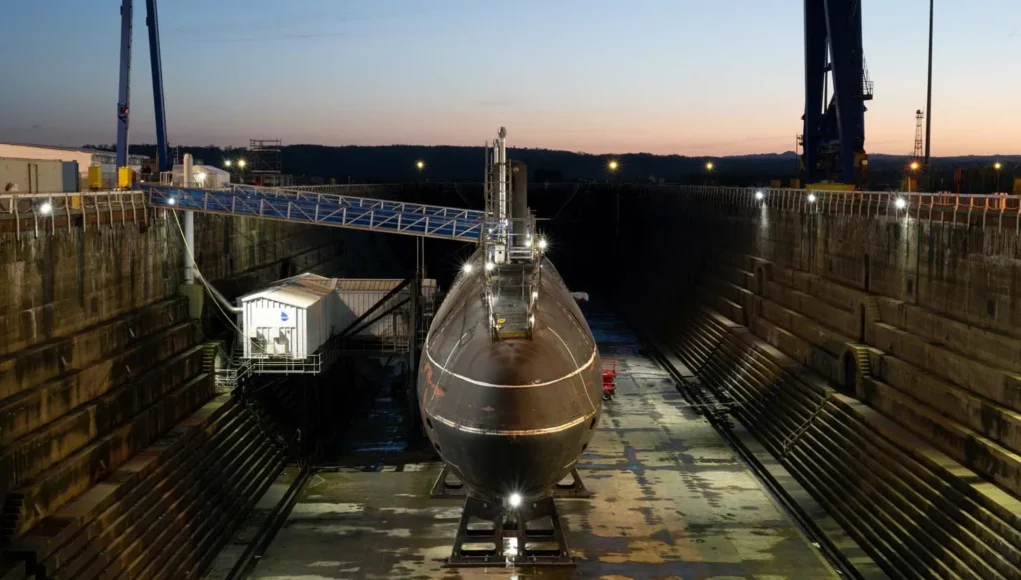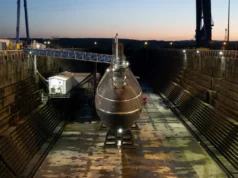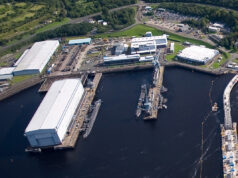During a recent exchange in the House of Lords, Lord Coaker expressed the urgency for the UK to expedite its nuclear submarine dismantling programme, addressing the slow progress in decommissioning and dismantling outdated submarines.
Responding to a question from Baroness Bryan of Partick, he outlined the current challenges and ongoing efforts to dismantle the aging fleet, currently spread across Scotland and Devonport, and acknowledged that, without significant changes, the timeline could stretch into decades.
Baroness Bryan highlighted widespread concerns, pointing out that many submarines have been out of service for years or even decades without being dismantled. She cited, for example, the case of a Dreadnought-class submarine stationed at Rosyth since 1980, a delay emblematic of the broader issue. “There remains real concern that not one of these submarines has yet been dismantled,” she noted, adding that with the rate of dismantling, “it will take decades to dismantle the boats remaining in both Scotland and Devonport.”
In response, Lord Coaker reiterated the government’s commitment to speeding up the dismantling process, emphasising that HMS Swiftsure, now in dry dock at Rosyth, is the first decommissioned nuclear submarine undergoing full dismantling as a demonstrator. This project, he noted, is critical in refining techniques for safely dismantling other vessels. “Swiftsure is now in dry dock. That will be fully dismantled by the end of 2026,” he explained, underscoring the commitment to completing this initial phase on schedule.
He added that dismantling Swiftsure is expected to generate a template for future dismantling, providing valuable lessons on the intricate processes involved. “The whole point of Swiftsure is that it acts as a demonstrator project so that we can learn from how that was done — what worked and what perhaps could have been improved — and then apply that to all the other submarines that have been decommissioned,” he explained.
The Minister acknowledged the scale of the challenge, noting that, beyond Swiftsure, there are currently seven decommissioned and defueled submarines stationed at Rosyth and an additional 15 at Devonport, four of which have also been defueled. “We need to speed up the process,” he stated, signalling that the government is exploring “every way in which we can do that.”
Addressing further questions from Lord Trefgarne, Lord Coaker elaborated on the new class of submarines that will eventually replace the decommissioned vessels, mentioning the ongoing construction of Astute-class submarines, with seven ordered and six already in the water.
The successor to the Vanguard class, which forms the basis of the UK’s nuclear deterrent, is expected to enter service by the early 2030s. “We are making considerable progress,” he assured, though he acknowledged that the demands of dismantling and maintaining current submarines could extend patrol periods for crews, an issue the government is addressing to support personnel welfare.
Concerns around safety were also raised by Baroness Smith of Newnham, who questioned the security and maintenance of these decommissioned submarines. Lord Coaker responded with assurances that “we are looking to accelerate the dismantling programme,” while ensuring strict adherence to safety protocols. He encouraged peers to bring any unaddressed freedom of information requests on the subject directly to him, pledging prompt responses.
The dismantling process also hinges on finding a suitable disposal site for nuclear waste, a point raised by Lord Fox. While Lord Coaker could not confirm whether this process would require new legislation, he pledged to investigate further, stating, “I may need to write to the noble Lord… but I do not want to get the planning process wrong or give the wrong answer on whether primary or secondary legislation is needed.”
As the discussion progressed, Baroness Goldie raised a 2021 government update that set a target for recycling 90% of materials from decommissioned submarines, a goal Lord Coaker confirmed remains in place. He highlighted that the dismantling of Swiftsure aligns with this recycling target, stating, “We expect 90% of that to be recycled.”
Throughout the debate, Lord Coaker underscored the government’s commitment to maintaining the UK’s continuous at-sea deterrent, particularly in the face of perceived threats from Russian submarine activity in the Atlantic. He reaffirmed the strategic importance of the deterrent, stressing that it has remained a “crucial part of our defence of our democracy, of our freedom and against Russian aggression.” He assured the Lords that “our adversaries should know that, 24 hours a day, seven days a week and 365 days a year, our at-sea deterrent will continue for as long as is necessary.”














jsel, And some prawn was talking about nuclear wars embarrassing
Is there a reason so many of the Devonport subs still have fuel in them? The only reason I can think is they are the more recent S or T boats sitting in a cool-down phase?
Issues with the RAH are probably the reason for the delay.
Your blog post was so relatable – it’s like you were reading my mind! Thank you for putting my thoughts into words.
sixteen million pounds per boat is spent on maintaining these boats the condition that they currently are in, this money should have had been used somewhere else modern technology should have been tasked to sort it out. the remaining subs we are told often, produce enough energy to power whole towns and cities that’s what we should be working on. integrate that power into the national grid shouldn’t be a task that is beyond us
They don’t generate electricity, Andy. They generate steam to drive the main engine, and a relatively small proportion of that for electrical energy. You would have to somehow build a steam pipe to take the entire steam output of the core out of the vessel, in dock, and then run it through a shore installation to generate electrical power.
The core is long spent and past it’s best and is not suitable to operate like this. It would be far more expense and risk than it would possibly be worth to do that. The cores just don’t have the life in them left to mess with them like that.
Before disposing it why don’t they donate it to third world countries like the gambia my country we never owned a submarine just a though
The fuel used is highly enriched, so it could be used as a precursor for nuclear weapons. There were many hoops to jump through to allow AUKUS submarines to go to Australia without that being deemed nuclear proliferation. Furthermore a UK/US treaty forbids any nuclear submarine technology being passed to a third country without both signatories approval, and the US wouldn’t even let as close an ally as Canada have it.